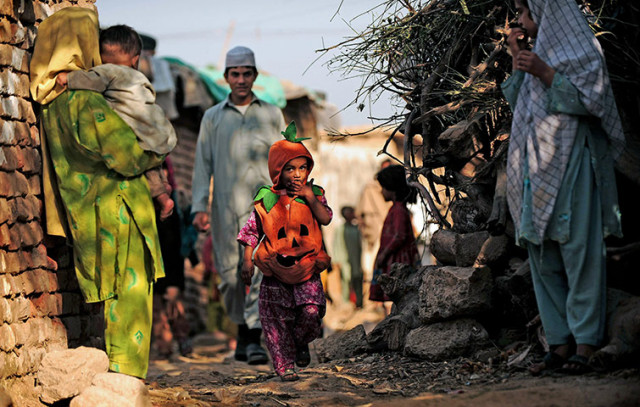Checking crime: Police to sniff out aliens from katchi abadis
Interior ministry says foreign nationals residing in slums, carry out illegal activities .

Officials consider the Afghan Basti in Sector I-11 as the most ‘notorious’ of the lot. PHOTO: AFP/FILE
The interior ministry has decided to renew its ‘efforts’ aimed at keeping track of foreign nationals reportedly residing at various katchi abadis of the capital, it has been learnt reliably.
The ministry has been working out a plan for the last one-and-a-half year to keep a check on activities of foreign nationals living in various katchi abadis in and around the capital.
The plan included establishment of police pickets at katchi abadis, closure of additional entry and exist points to the slums, and a special check by law-enforcement agencies on day-to-day activities of aliens.

In the first phase of plan, registration of families and individuals living at 24 katchi abadis including the Afghan Basti at Sector I-11 was carried out.
“For reasons unknown, upon successful completion of the first phase, the project was abandoned. But now the interior minister has once again sought a report from the relevant departments over the issue,” said a senior official of the ministry, requesting anonymity.
He said the exact number of foreign nationals living at these slums is unknown but the majority are Afghan nationals, as well as some African and central Asian natives.
“Representatives of police, Islamabad Capital Territory Administration and the Capital Development Authority (CDA) will hold the first meeting over the issue next week,” said the official.
Last year, while informing the lower house of parliament about presence and activities of foreigners in Islamabad, Interior Minister Chaudhary Nisar Ali Khan had said “If I reveal the real facts to you [parliamentarians], many among you will have sleepless nights. They [foreigners] are involved in all kinds of crime in the capital.”
An official of the CDA, who is due to participate in the proposed meeting, also stressed the need for differentiation between encroachments and katchi abadis.
He said as per the defined government policy, a katchi abadi, whether legal or illegal, is a settlement established on state land rather by encroaching upon the land belong to private individuals or citizens.
He said in the first phase of the renewed efforts, a line would be drawn between the katchi abadis and encroachments and a future course of action would be defined on this basis.
The agenda of the meeting would also include establishment of police pickets at the earliest at those settlements where crime rate is high and number of foreign nationals is significant, shared the CDA official.
According to the ministry’s record, from 2009-2014, the Islamabad Police traced 674 cases of various crimes -- from narcotics peddling to abduction for ransom -- back to the capital’s slums.
A survey of the slums carried out in the first phase of this project has put the total number of legal and illegal slums at 24. Of them 21 are located in urban areas, while the rest are in rural areas.
A total of 13,521 families consisting of 84,591 individuals reside in them. Out of the 24 slums, only 10 are recognised. The police had also suggested the CDA to remove some 11 katchi abadis at the earliest, while fencing off the remaining. However, on-ground action is yet to initiate in this regard.
Officials consider the Afghan Basti in Sector I-11 as the most ‘notorious’ of the lot. In the past, several efforts were made to vacate the settlement but it failed due to uncoordinated efforts by government departments and sometimes due to resistance from slum dwellers or politicians.
Published in The Express Tribune, February 9th, 2015.



















COMMENTS
Comments are moderated and generally will be posted if they are on-topic and not abusive.
For more information, please see our Comments FAQ